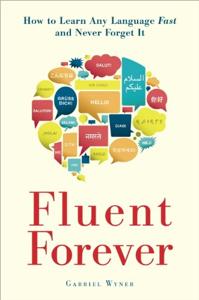
Want to learn the ideas in Fluent Forever better than ever? Read the world’s #1 book summary of Fluent Forever by Gabriel Wyner here.
Read a brief 1-Page Summary or watch video summaries curated by our expert team. Note: this book guide is not affiliated with or endorsed by the publisher or author, and we always encourage you to purchase and read the full book.
Video Summaries of Fluent Forever
We’ve scoured the Internet for the very best videos on Fluent Forever, from high-quality videos summaries to interviews or commentary by Gabriel Wyner.
1-Page Summary of Fluent Forever
Overview
Why is learning a language such an uphill battle? It can feel like you’re fighting to remember new words, memorize grammar rules, and pronounce every word correctly. Gabriel Wyner’s Fluent Forever aims to make the process of learning a language more fun by combining neuroscience with tricks on pronunciation and memory. His tips helped him learn German in 14 weeks, so they should work for anyone else who tries them out.
After reading this, you will be able to attack new languages or any memory challenge with a much better chance of reaching your goals.
The author will teach you how to use Google Images and why DVD subtitles are evil. He’ll also explain that Japanese people can learn the difference between “rock” and “lock.”
Big Idea #1: Images and personal connections make remembering easier for the brain.
If you have ever tried to learn a new language, then you know how frustrating it is when you forget what you learned. Luckily, there are some ways to get those words to stick in your memory. One of them is by making connections between the word and something personal for yourself. The brain processes words on four different levels: structure, sound, concept and connection.
In one experiment, students were asked to recall words after being given a memory test. They were six times more likely to remember the word if they had been asked a personal question like “Do you like pizza?” rather than questions about sound or structure.
If you want to remember a word in Spanish (gato), connect it to a memory of a cat. If you can visualize the word, then you’ll be able to recall it more easily. Our visual memory is an effective tool for remembering language. In 1960, college students were shown 612 images and asked to pick out the original ones later. They were able to do this with 98.5 percent accuracy.
It’s evident that associating an image with a word makes it easier to remember.
The next time you meet someone named Edward, think of the character Johnny Depp played in a movie. That way, you’ll always remember his name.
Big Idea #2: When it comes to memory, recalling is better than reviewing.
Everyone has had the experience of cramming for an exam. We study until our heads feel like they’re about to explode, but then we hope that we pass anyway. However, how much do we actually remember after a week? A month? A year?
The truth is that your memory isn’t as good as you think it is. Repetition doesn’t necessarily help, either.
Ebbinghaus, a German psychologist, spent years memorizing lists of nonsense syllables. He then tested how long it would take to relearn the same list and found that we can recall about 30 percent after 24 hours but only 10 percent a year later.
But what about repeating something over and over again to remember it? Well, that’s called “overlearning,” and experiments have shown that it doesn’t help a lot.
So, what can we do? We can use the act of recalling information from the past to help us remember it.
In one study, participants who wrote down what they remembered from a list of Spanish words could remember more than those who studied the list.
Participants who wrote down the words they learned remembered 35% more than those who didn’t. This is because they had to recall the Spanish words, which helped them remember them better.
Neuroscience has shown that recalling memories makes you feel good. It’s a reward mechanism and it encourages the brain to store more memories.
Big Idea #3: Spaced repetition systems (SRS) make memorization more effective.
Long term memory is unreliable so we should try to time our learning better. We can use timing when acquiring a new language.





